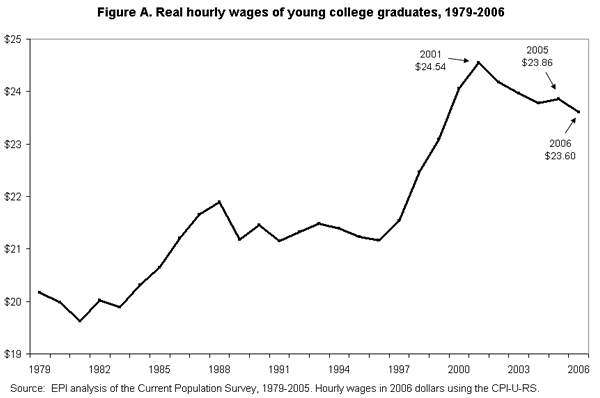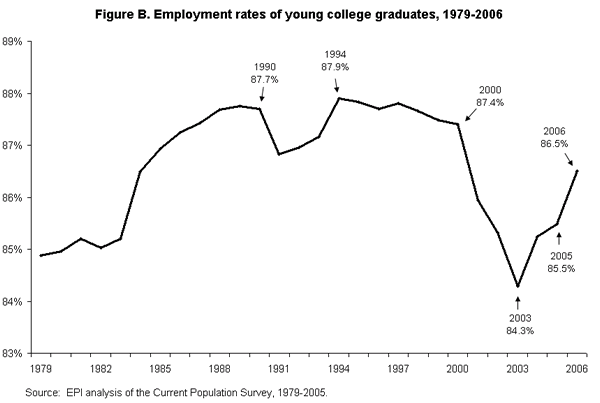For more recent, related data, see:
- The Class of 2012: Labor market for young graduates remains grim
- The Wages chapter (see from pg. 302; pg. 131 in reader-view) in The State of Working America, 12th Edition
The labor market for young college graduates, those ages 25 to 35, is slowly improving, but remains weaker than before the last recession in 2001.
These well-schooled individuals—possessing at least a bachelor’s degree, and in some cases, an advanced degree—would be expected to fare better than those without college degrees because demand for their skills should insulate them from labor market fluctuations. However, while their employment levels are higher than those without college degrees, employment trends still indicate that young college graduates have not returned to the wage levels or employment rates just prior to the start of the 2001 recession.
After a slight rise in real hourly wages among young college graduates in 2005, their wages fell again in 2006, continuing an otherwise downward trend since 2001. Hourly wages in 2006 were $23.60, down from $23.86 in 2005 and still below the level of $24.54 in 2001 (Figure A).

The failure of wages to recover can be attributed to slow employment growth. Compared to the last “jobless recovery” of the early 1990s, employment rates of today’s young college graduates have fallen farther and failed to bounce back. In 1989, the peak year before the last recession, the employment rate for this group was 87.7%, similar to their employment rate in 2000 (87.4%), the most recent peak year. Five years later, by 1994, the employment rate of young college graduates had fully recovered. Six years after the most recent peak, there is still a .9 percentage point gap remaining.
The employment rate did pick up between 2003 and 2006 (2.2 percentage points), but it is still below the rates experienced in the mid-1990s through 2000, when employment exceeded 87.4% each year (Figure B).

Although the overall employment situation has been improving since 2003, employment growth has been too slow to compensate for the losses during the recession and jobless recovery. Young college graduates are still facing lower real wages than they did six years ago. Even with employment rates climbing steadily, it is surprising that wages have not improved. There appear to be jobs, however, these workers seem to have little bargaining power to bid up their wages. It is possible that these workers are underemployed or there is a job quality problem, as exemplified by the low rate of employer-provided health insurance.
